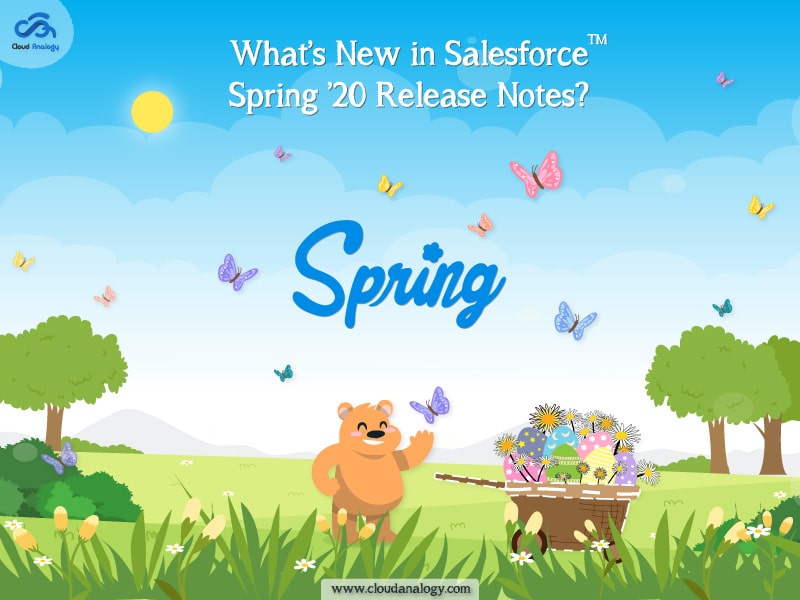Sharing is caring!
Every year, Salesforce releases three updates – Winter, Spring, and Summer in order to keep its environment optimized and running smoothly. This time, Salesforce has come up with the Spring ’20 release.
The Salesforce Spring’20 release notes include details about new and modified features that would be implemented in the Salesforce Org. The most interesting part is that the latest features of newly-released Spring ’20 offer more personalized customer journeys while allowing your teams to work smarter and faster with new levels of data-driven insights across the organization.
Here is a quick overview of Salesforce Spring’s 20 release notes! Read on and explore the most exciting new features and upgrades of the newest Salesforce release.
Managing the deleted reports and dashboards in the Recycle Bin for Salesforce Lightning Experience
Salesforce users can view, restore, and delete their reports and dashboards permanently without making the transition to Salesforce Classic. Earlier, the users either had to select individual items to delete or switch to Salesforce Classic for permanently deleting all items at once.
Cloning objects along with their related actions
Salesforce is now providing users with an option where they can clone parent records with related child records as well. Cloning of records would make it simple to handle a variety of repeating business processes. By clicking on Clone with Related, all of the original object’s related records would be added to the cloned object.
Creating a filtered list of records using new time-related conditions
Users now have more options for filtering a list of records using time-based conditions in a conversational search.
The users need to enter a conversational search utilizing the words modified, created, viewed or closed with a particular period of time to get the most relevant and accurate search results.
Accessing all Lightning Experience Configuration Converter tabs from one place
The new Home tab is the main port for the transition tool. The tiles describe the status and progress of each tab in the Lightning Experience Configuration Converter. This will help users track their progress and change the tab’s status icon color to green. It also offers features such as the conversion of the simple JavaScript alerts to Lightning Components through the Lightning Experience Configuration Converter.
Attaching Formatted Spreadsheets to Report Subscriptions
After subscribing to reports, users would have a new option to choose for receiving results as a formatted spreadsheet attached to the subscription email. The email contains general report details, for example, report name and time run, as well as links to complete Salesforce reports.
Einstein Voice Assistant – With Einstein Voice Assistant, companies can build voice-powered apps for replacing mundane data entry operations or manual navigation in Salesforce.
Salesforce Einstein Voice Assistant features will allow sales reps to make on-the-go updates to Salesforce Org such as generating contacts, logging events, and, updating or modifying opportunities—all by Einstein Voice Skills.
Communicating through Salesforce UI Technologies with the Lightning Message Service API
Salesforce users can now utilize the Lightning Message Service API for communicating between VisualForce Lightning or Lightning Web Components. They can now create Lightning Web Components to communicate with existing Visualforce pages or Aura components.
The @track decorator is not required for Lightning Web Components
The @track Decorator is no longer required for Lightning Web Components as Salesforce makes all LWC class fields reactive. This means that if the value of a field used in a template or getter of property changes then the component would get re-render and show the new value.
There is no maximum daily limit for API calls
Salesforce has eliminated the maximum daily limit of 1,000,000 API requests. This change applies to the Enterprise Edition and Professional Edition with API access enabled.
Protect Your Sandbox Data with Salesforce Data Mask
The Salesforce Data Mask is a powerful new data protection resource for Salesforce administrators and developers. Instead of providing data manually and accessing the sandbox orgs, administrators can use Data Mask to automatically mask data in the sandbox.
Data Mask is a managed package that needs to be installed in the production Org.
Provides Field- and Object-Level Security in Apex
The Security.stripInaccessible method is now generally available for the field- and object-level data protection. Utilize the stripInaccessible method to delete fields that cannot be accessed by users from query and subquery results. The method can be used to delete inaccessible fields from sObjects before a DML operation to prevent exceptions.
The Lightning Extension for Google Chrome is generally available
With the Lightning Extension, users can now access the latest features and functionalities of the Salesforce Lightning Experience.
Personalize Participant Journey with Salesforce Surveys
The participant now would have the ability to view pages and questions based on their previous responses. The users can customize their survey page by adding images. Moreover, users can now personalize questions for their participants by inserting participants’ responses from previous questions.
Simplify Profiles and Logins on Salesforce-based sites with Trailblazer.me
With Trailblazer.me, users can now access multiple Salesforce-related sites with a single login and manage their profile and login settings in one place.
Salesforce Spring ’20 Release Important Dates
- The preview instances will be updated on January 3 and January 4, 2020.
- The non-preview instances will be updated on February 14 and February 15, 2020.
That’s a quick look at some of the more interesting Spring ’20 features.
Which feature did you like the most in Spring’20 Release Notes? Let us know in the comments section below.

Deepali Kulshrestha
Salesforce Certified Developer | Delivery Management Head
Deepali, a certified Salesforce Advanced Administrator and Salesforce Developer and CSPO Certified at Cloud Analogy, is a successful name in the industry circles when it comes to the delivery of successful projects with end-to-end testing. Deepali is a globally-renowned industry stalwart when it comes to managing Operations & Delivery Planning in driving Business Performance Management.Hire the best Salesforce Development Company. Choose certified Salesforce Developers from Cloud Analogy now.










